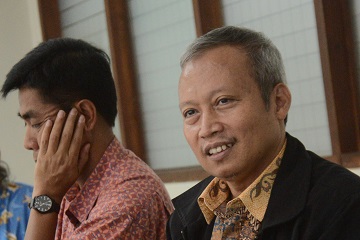Professor Chair Holder of IPB: Developed Artificial Intelligence System for a Decision Making in Agroindustry

The agricultural industry is unique because agriculture played a central role in our national heritage. It is arguably worth supporting farming and rural communities because farming and rural communities have value beyond the value of the food and other agricultural products produced. The world of agriculture is a unique world, full of uncertainty, risky and has a long supply chain. Farmers have very little economic power in comparison to powerful packers, processors, retailers, and input providers. Packers and processors exercise oligopoly power and can lower prices paid for agricultural products below economically efficient price levels. Risk lovers and added value in the agricultural world are still unbalanced. So far, more added value is enjoyed in the downstream sector. The farmer or the upstream part received little. Conversely, the most at risk are farmers or the upstream and downstream risks are fewer. Then how can efforts be made to achieve justice it.
Professor Chair Holder of the Department of Agricultural Industrial Technology (TIN) of the Faculty of Agricultural Technology of ) Bogor Agricultural University (FATETA IPB), Prof. Dr. Ir. Marimin, in a press conference prior his Scientific Oration at IPB Campus, Baranangsiang, Bogor, on 24 August 2017, presented his findings on farm value-added equilibration model using artificial algorithm and Sistem Pengambilan Keputusan Cerdas (SPKC Intelligent Decision Making System). According to him, asymmetric and less transparent information are often exploited by the middleman so that material prices are lower at farm level and product prices become very high at the consumer level. Therefore, benefit sharing, value added Risk Management in agriculture should be pursued more equitably with appropriate and transparent information.
"Palm oil farmers only get 4.27 percent added value, while palm oil factory gets added value up to 40.02 percent. Through models and simulations with enhanced agent-based techniques with intelligent algorithms can be done for value-added balancing. The value-added distribution would be fair if the farmer's added value increased by 13 percent, while the industry's added value was 14 percent, "he said.
In addition, critical decisions should often be taken on determining the amount of production and scheduling, warehousing, distribution, and transportation as well as other related resource planning. To support the reliability of the decision-making system, Prof. Marimin develops SPKC.
As a consequence, the Intelligent Decision Making System SPKC for agricultural commodities and agro-industry products are becoming more complex than common. developed with a hard system approach and soft system. This system is supported with integrated database of Agricultural commodity, knowledge base, smart model base and user friendly interface that can help users at different levels of decision making. Decisions are made at different levels in an organisation's hierarchy: Strategic decisions are long-term in their impact.
"SPKC is symmetric information among supply chain actors, so that the perpetrator will adjust to change information changes. Supply chain innovation means taking full advantage of best of breed technology and data algorithms that empower intelligent decision-making. SPKC with Online Analytic Processing (OLAP) and spatial information system is useful to provide real time information, "he said. (Wied)



